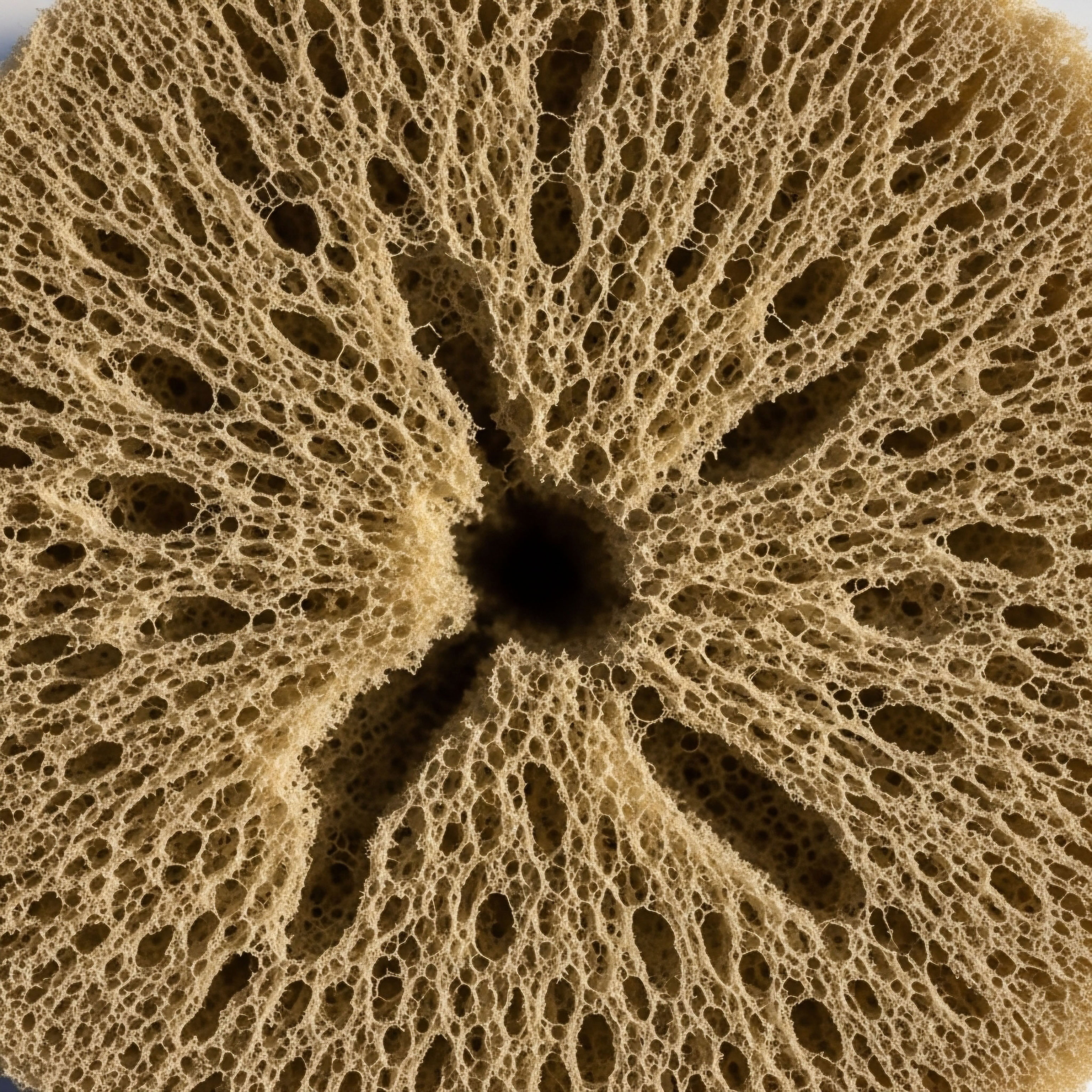

Fundamentals
Have you found yourself grappling with an unexplained weariness, a persistent mental haze, or perhaps shifts in your emotional landscape that feel unfamiliar? Many individuals encounter these sensations, often dismissing them as inevitable aspects of getting older or simply “feeling off.” Yet, these experiences frequently serve as signals from your body’s intricate internal communication network ∞ your hormones.
These chemical messengers orchestrate countless physiological processes, from regulating your energy levels and mood to governing your sleep patterns and metabolic rate. When this delicate system falls out of balance, the effects can ripple throughout your entire being, diminishing your vitality and altering your daily function.
Understanding your own biological systems represents a powerful step toward reclaiming your well-being. While modern therapeutic interventions, such as hormonal optimization protocols, offer significant support in restoring equilibrium, their effectiveness is profoundly shaped by the choices you make each day. Think of hormonal therapy as a finely tuned instrument; lifestyle factors represent the skilled musician.
The instrument can produce beautiful music, but the quality of the performance depends on the hands guiding it. Your daily habits are not mere accessories to treatment; they are fundamental determinants of how well your body responds and how fully you experience renewed health.
Your daily habits are not mere accessories to treatment; they are fundamental determinants of how well your body responds and how fully you experience renewed health.
The interplay between your lived experience and your internal biochemistry is constant. Every meal you consume, every hour you rest, every movement you make, and every stressor you encounter sends signals that either support or disrupt your endocrine system. Recognizing this connection allows for a more personalized and potent approach to wellness. We are not simply addressing symptoms; we are recalibrating a complex biological system, aiming for sustained vitality.

How Do Daily Habits Influence Endocrine Function?
The endocrine system operates through a series of feedback loops, much like a sophisticated thermostat system regulating temperature in a home. When hormone levels drop or rise beyond optimal ranges, the body attempts to self-correct. However, persistent lifestyle stressors can overwhelm these natural regulatory mechanisms.
Consider the impact of chronic sleep deprivation on cortisol, the body’s primary stress hormone. Prolonged elevated cortisol can disrupt the balance of other vital hormones, including those involved in reproduction and metabolism. Similarly, dietary choices influence insulin sensitivity, which in turn affects a wide array of hormonal signals.
Physical activity also plays a direct role in hormonal regulation. Regular movement can improve insulin sensitivity, modulate sex hormone levels, and support overall metabolic health. Conversely, a sedentary existence can contribute to metabolic dysfunction, creating an environment less receptive to hormonal therapies. The body’s ability to synthesize, transport, and utilize hormones is deeply intertwined with its overall metabolic state, which is directly influenced by diet and exercise.
The concept of personalized wellness protocols acknowledges that each individual’s biological response is unique. While a specific hormonal optimization protocol might be clinically indicated, its ultimate success hinges on the individual’s commitment to supporting lifestyle practices. This synergistic approach aims to create an internal environment where therapeutic agents can function optimally, leading to more profound and lasting improvements in health and well-being.


Intermediate
Moving beyond the foundational principles, we now consider the specific ways lifestyle choices interact with targeted hormonal optimization protocols. These interventions, whether involving testosterone replacement, progesterone support, or growth hormone peptides, are designed to restore specific biochemical levels. However, their true effectiveness is not solely dependent on the administered dose; it is significantly modulated by the body’s receptivity and metabolic environment, both of which are shaped by daily habits.

Optimizing Testosterone Replacement Therapy Outcomes
For men experiencing symptoms of low testosterone, often termed andropause, Testosterone Replacement Therapy (TRT) protocols typically involve weekly intramuscular injections of Testosterone Cypionate. This therapy aims to replenish circulating testosterone levels, addressing concerns such as diminished energy, reduced muscle mass, and changes in mood.
Alongside this, medications like Gonadorelin may be administered subcutaneously twice weekly to maintain natural testosterone production and preserve fertility by stimulating the pituitary gland. Anastrozole, an oral tablet taken twice weekly, helps manage estrogen conversion, preventing potential side effects. Some protocols may also include Enclomiphene to support luteinizing hormone (LH) and follicle-stimulating hormone (FSH) levels.
The efficacy of these precise biochemical recalibrations is directly influenced by lifestyle. Consider the impact of body composition. Excess body fat, particularly around the abdomen, can increase the activity of the enzyme aromatase, which converts testosterone into estrogen. This conversion can counteract the benefits of TRT, necessitating higher doses of Anastrozole or leading to suboptimal outcomes. Regular physical activity, especially resistance training, helps maintain lean muscle mass and a healthier body composition, thereby supporting a more favorable hormonal milieu.
Nutritional choices also play a critical role. A diet rich in whole, unprocessed foods, healthy fats, and lean proteins provides the necessary building blocks for hormone synthesis and supports metabolic pathways. Conversely, diets high in refined sugars and unhealthy fats can contribute to insulin resistance and systemic inflammation, both of which can impede hormonal signaling and reduce the body’s responsiveness to exogenous hormones.
The body’s receptivity to hormonal therapies is significantly modulated by its metabolic environment, which is shaped by daily habits.

Supporting Female Hormonal Balance Protocols
Women navigating pre-menopausal, peri-menopausal, or post-menopausal changes often experience symptoms like irregular cycles, mood fluctuations, hot flashes, and reduced libido. Protocols for female hormonal balance may include Testosterone Cypionate, typically administered weekly via subcutaneous injection in lower doses (e.g. 10 ∞ 20 units or 0.1 ∞ 0.2ml). Progesterone is prescribed based on menopausal status, and long-acting pellet therapy for testosterone, sometimes with Anastrozole, represents another option.
For women, sleep quality holds particular significance. Sleep disturbances can disrupt the delicate pulsatile release of reproductive hormones, including estrogen and progesterone. Prioritizing consistent, restorative sleep can help stabilize these natural rhythms, making the body more receptive to therapeutic interventions. Stress management techniques, such as mindfulness practices, also play a vital role in modulating the hypothalamic-pituitary-adrenal (HPA) axis, which can otherwise interfere with ovarian hormone production and metabolism.
The type and intensity of physical activity also influence female hormonal health. While regular, moderate exercise is beneficial, excessive or overly strenuous training can sometimes suppress ovarian function, particularly in younger women. Tailoring physical activity to individual needs and hormonal status is paramount.

Peptide Therapies and Lifestyle Synergy
Growth hormone peptide therapy, utilizing agents like Sermorelin, Ipamorelin / CJC-1295, Tesamorelin, Hexarelin, and MK-677, aims to stimulate the body’s natural production of growth hormone. These peptides are often sought by active adults and athletes for anti-aging benefits, muscle gain, fat loss, and sleep improvement. Other targeted peptides, such as PT-141 for sexual health and Pentadeca Arginate (PDA) for tissue repair, also represent precise biochemical interventions.
The effectiveness of peptide therapies is highly dependent on the body’s metabolic and cellular environment. Adequate protein intake is essential, as peptides are composed of amino acids, and sufficient protein provides the raw materials for their synthesis and action. Similarly, a nutrient-dense diet supports the cellular machinery involved in growth hormone signaling and tissue repair.
The body’s ability to recover and regenerate, a key target of many peptides, is profoundly affected by sleep and stress. Deep, restorative sleep is when the majority of natural growth hormone release occurs. Chronic stress, by elevating cortisol, can counteract the anabolic effects of growth hormone and peptides, potentially diminishing their benefits.
The table below summarizes how specific lifestyle elements interact with various hormonal optimization protocols ∞
| Lifestyle Element | Impact on Testosterone Replacement Therapy (Men) | Impact on Female Hormonal Balance Protocols | Impact on Growth Hormone Peptide Therapy |
|---|---|---|---|
| Nutrition | Supports lean mass, modulates estrogen conversion, provides hormone precursors. | Aids in metabolic regulation, supports gut health, influences hormone metabolism. | Provides amino acids for peptide synthesis, supports cellular repair, influences growth hormone signaling. |
| Physical Activity | Builds muscle, improves body composition, enhances insulin sensitivity. | Regulates menstrual cycles, supports bone density, modulates stress response. | Stimulates natural growth hormone release, improves recovery, enhances body composition. |
| Sleep Quality | Optimizes natural testosterone pulsatility, aids recovery, reduces cortisol. | Stabilizes reproductive hormone rhythms, mitigates hot flashes, improves mood. | Essential for natural growth hormone secretion, supports cellular repair, reduces inflammatory markers. |
| Stress Management | Reduces cortisol interference, supports adrenal function, improves mood. | Balances HPA axis, lessens symptom severity, supports ovarian function. | Minimizes catabolic effects of cortisol, preserves anabolic pathways, enhances overall well-being. |
The synergy between lifestyle and therapeutic intervention is undeniable. Patients who actively engage in supportive lifestyle practices often experience more pronounced and sustained benefits from their hormonal optimization protocols. This collaborative approach, where precise medical interventions are complemented by diligent self-care, represents the pinnacle of personalized wellness.

What Lifestyle Adjustments Support Hormonal Protocols?
Implementing specific lifestyle adjustments can significantly enhance the effectiveness of hormonal optimization protocols. These adjustments are not about deprivation; they are about providing the body with the conditions it needs to function optimally.
- Dietary Composition ∞ Prioritize a diet rich in whole, unprocessed foods. Include ample lean proteins, healthy fats (such as those found in avocados, nuts, seeds, and olive oil), and a wide array of colorful fruits and vegetables. These provide essential vitamins, minerals, and antioxidants that support hormonal synthesis and metabolism. Limit refined sugars, processed foods, and excessive alcohol, which can disrupt hormonal balance and increase inflammation.
- Structured Physical Activity ∞ Incorporate a balanced exercise regimen that includes both resistance training and cardiovascular activity. Resistance training helps build and maintain muscle mass, which is metabolically active and supports a healthy body composition. Cardiovascular exercise improves heart health and overall circulation, aiding in hormone transport and cellular receptivity.
- Restorative Sleep Practices ∞ Aim for 7-9 hours of quality sleep each night. Establish a consistent sleep schedule, create a dark and cool sleep environment, and limit screen exposure before bedtime. Adequate sleep is vital for the pulsatile release of many hormones, including growth hormone and testosterone.
- Effective Stress Mitigation ∞ Practice techniques that help manage chronic stress, such as mindfulness meditation, deep breathing exercises, or spending time in nature. Chronic stress elevates cortisol, which can negatively impact other hormonal axes. Finding effective ways to reduce daily stress can significantly improve hormonal balance and overall well-being.


Academic
To truly appreciate how lifestyle choices affect hormonal therapy efficacy, one must delve into the intricate biochemical and physiological mechanisms at play. The human endocrine system is a complex network of glands, hormones, and receptors, operating through sophisticated feedback loops. When exogenous hormones or peptides are introduced, their ultimate impact is determined not only by their pharmacological properties but also by the endogenous environment, which is profoundly shaped by an individual’s daily habits.

Interplay of Biological Axes and Metabolic Pathways
The Hypothalamic-Pituitary-Gonadal (HPG) axis, a central regulator of reproductive hormones, exemplifies this interconnectedness. The hypothalamus releases gonadotropin-releasing hormone (GnRH), which stimulates the pituitary gland to secrete luteinizing hormone (LH) and follicle-stimulating hormone (FSH). These gonadotropins then act on the gonads (testes in men, ovaries in women) to produce sex hormones like testosterone, estrogen, and progesterone.
Lifestyle factors can directly influence each level of this axis. For instance, chronic psychological stress, mediated by the Hypothalamic-Pituitary-Adrenal (HPA) axis, can suppress GnRH pulsatility, thereby dampening the entire HPG axis. This phenomenon, often observed in states of severe caloric restriction or excessive exercise, illustrates how an altered metabolic state can directly impede hormonal signaling.
Metabolic health, underpinned by factors like insulin sensitivity and glucose regulation, exerts a pervasive influence on hormonal function. Insulin resistance, a common consequence of sedentary lifestyles and diets high in refined carbohydrates, can lead to hyperinsulinemia. Elevated insulin levels can, in turn, affect sex hormone-binding globulin (SHBG) levels, altering the bioavailability of sex hormones.
In men, insulin resistance is frequently associated with lower free testosterone levels, even when total testosterone appears within range. For women, it can contribute to conditions like polycystic ovary syndrome (PCOS), characterized by androgen excess and ovulatory dysfunction. Hormonal therapies, such as testosterone replacement, are therefore introduced into a metabolic landscape that can either enhance or diminish their intended effects.
The effectiveness of hormonal therapies is determined not only by their pharmacological properties but also by the endogenous environment, which is profoundly shaped by an individual’s daily habits.

Molecular Mechanisms of Lifestyle Influence
At a molecular level, lifestyle choices influence hormone receptor sensitivity, hormone synthesis, and hormone metabolism.
- Receptor Sensitivity ∞ Hormones exert their effects by binding to specific receptors on target cells. The number and sensitivity of these receptors can be modulated by various factors. For example, regular physical activity has been shown to increase insulin receptor sensitivity, allowing cells to respond more effectively to insulin. Similarly, dietary components, particularly certain fatty acids, can influence the fluidity and function of cell membranes, thereby affecting receptor binding efficiency. When cells are more receptive to hormonal signals, a given dose of exogenous hormone can elicit a more robust physiological response.
- Hormone Synthesis ∞ While hormonal therapies provide exogenous hormones, the body’s endogenous production pathways are still relevant, especially in protocols designed to stimulate natural production (e.g. Gonadorelin, Sermorelin). Adequate intake of micronutrients, such as zinc, magnesium, and vitamin D, is essential for the enzymatic reactions involved in steroidogenesis and peptide synthesis. Deficiencies in these cofactors can limit the body’s ability to produce its own hormones, potentially reducing the overall hormonal pool and requiring higher therapeutic doses.
- Hormone Metabolism and Clearance ∞ Hormones are metabolized and cleared from the body primarily by the liver and kidneys. Lifestyle factors significantly impact these processes. For instance, a healthy gut microbiome, supported by a fiber-rich diet, plays a role in the enterohepatic circulation of estrogens, influencing their reabsorption and elimination. Liver health, which can be compromised by excessive alcohol consumption or a diet high in processed foods, is critical for efficient hormone detoxification and metabolism. Impaired clearance can lead to an accumulation of certain hormone metabolites, potentially causing undesirable effects or altering the balance of active hormones.
Consider the impact of sleep deprivation on the HPA axis. Chronic sleep restriction leads to elevated evening cortisol levels and increased sympathetic nervous system activity. This sustained cortisol elevation can directly antagonize the effects of anabolic hormones like testosterone and growth hormone, promoting catabolism and hindering tissue repair and muscle protein synthesis. This biochemical antagonism means that even with optimal exogenous hormone administration, the body’s internal environment may be working against the desired therapeutic outcome.
The table below details specific biochemical interactions between lifestyle factors and hormonal pathways ∞
| Lifestyle Factor | Biochemical Mechanism | Impact on Hormonal Therapy Efficacy |
|---|---|---|
| High Refined Sugar Intake | Increases insulin resistance, elevates systemic inflammation, alters gut microbiome. | Reduces cellular responsiveness to hormones, impedes hormone metabolism, potentially increases side effects. |
| Chronic Sleep Deprivation | Elevates cortisol, disrupts circadian rhythm, reduces growth hormone pulsatility. | Antagonizes anabolic effects of TRT/peptides, impairs recovery, diminishes overall vitality. |
| Sedentary Lifestyle | Decreases insulin sensitivity, reduces muscle mass, promotes adipose tissue accumulation. | Lessens metabolic efficiency, increases aromatase activity (estrogen conversion), reduces receptor density. |
| Micronutrient Deficiencies | Limits cofactors for hormone synthesis (e.g. zinc for testosterone, iodine for thyroid). | Compromises endogenous hormone production, potentially requiring higher therapeutic doses or leading to suboptimal response. |
The scientific literature consistently supports the notion that lifestyle choices are not merely supportive; they are integral to the physiological landscape in which hormonal therapies operate. A deep understanding of these biochemical interdependencies allows for the creation of truly personalized wellness protocols, where therapeutic agents and daily habits work in concert to restore optimal physiological function. This integrated approach acknowledges the body as a dynamic system, where every input contributes to the overall output of health and vitality.

How Do Environmental Factors Affect Hormonal Balance?
Beyond diet, exercise, sleep, and stress, environmental exposures also play a role in hormonal balance. Exposure to endocrine-disrupting chemicals (EDCs), found in certain plastics, pesticides, and pollutants, can interfere with hormone production and function. These chemicals can mimic natural hormones, block hormone receptors, or alter hormone synthesis and metabolism, creating a challenging environment for the body’s endocrine system. Minimizing exposure to these substances can contribute to a more stable hormonal environment, potentially enhancing the effectiveness of therapeutic interventions.
The body’s detoxification pathways, largely managed by the liver, are crucial for processing both endogenous hormones and exogenous compounds, including EDCs. A diet rich in antioxidants and liver-supporting nutrients can bolster these pathways, helping the body to more efficiently clear undesirable substances and maintain hormonal equilibrium. This consideration underscores the systems-biology perspective, where seemingly disparate elements of daily life converge to influence the intricate world of hormonal health.

References
- BodyLogicMD Medical Review Board. Lifestyle Factors and Hormone Levels. BodyLogicMD. 2024 Feb 6.
- Kim, Tae Won, and Sung Soo Hong. Endocrine Physiology in Relation to Sleep and Sleep Disturbances. Neupsy Key. 2017 Mar 13.
- Neocleous Lab. Poor Sleep Quality and Endocrinology. Neocleous Lab Blood tests. 2023 Mar 21.
- The Marion Gluck Clinic. Stress & Hormone Imbalance ∞ How Stress Impacts Our Hormones. The Marion Gluck Clinic.
- US Women’s Medical Center. Lifestyle Tips For Hormone Replacement Therapy. US Women’s Medical Center.

Reflection
As we conclude this exploration, consider the profound agency you possess in your own health journey. The insights shared here are not merely academic points; they are invitations to a deeper relationship with your own physiology. Understanding how your daily choices resonate within your endocrine system transforms passive observation into active participation. Your body is a remarkable, adaptive system, constantly responding to the signals you provide.
This knowledge empowers you to move beyond simply managing symptoms. It guides you toward a path of true recalibration, where vitality is not just restored but sustained. The journey toward optimal hormonal health is a personal one, unique to your biology and your lived experience.
It calls for a thoughtful, informed approach, guided by both scientific understanding and an attuned awareness of your body’s responses. May this information serve as a compass, directing you toward a future of enhanced well-being and functional excellence.



